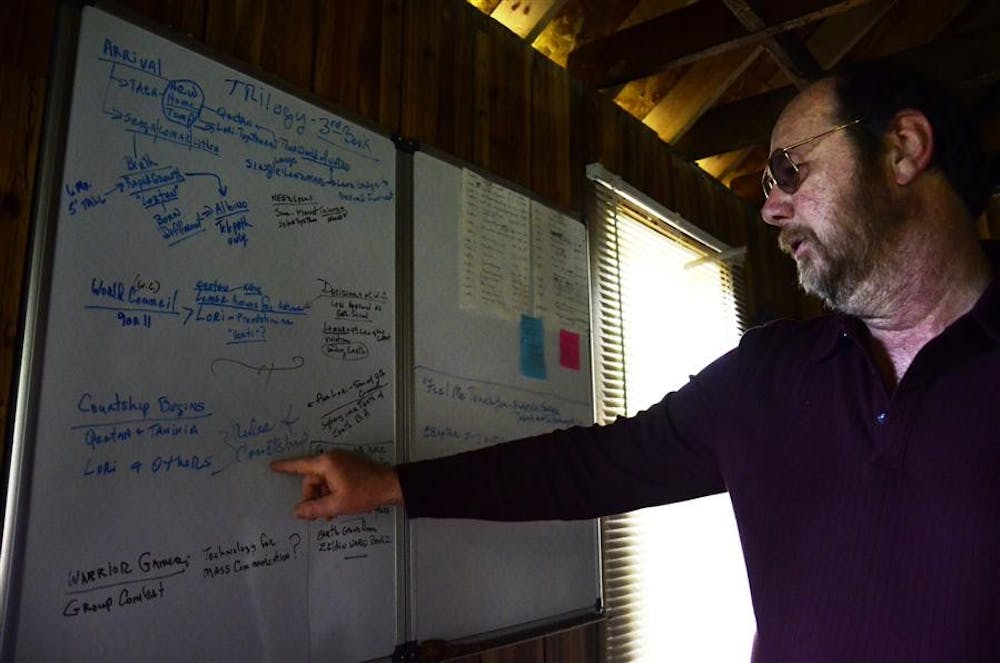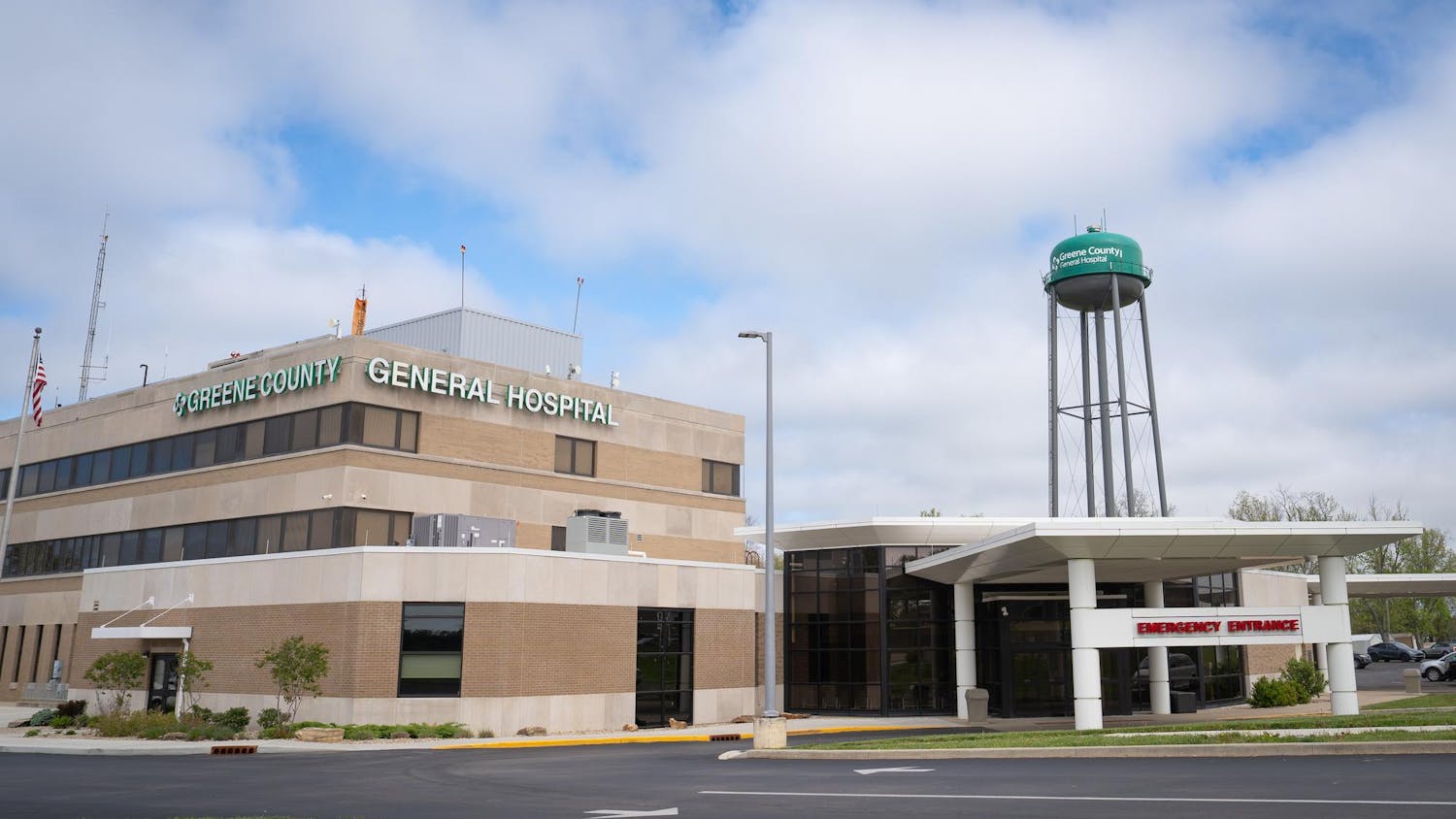Don Holmes’ small, white house began to shake.
Standing in front of his television, from where he initially disregarded the warnings, he hurried to his old, wooden desk, grabbed a flash drive and took cover in the far left corner of his bathroom.
Holmes hugged his cat Kiki so tight, he said she probably thought he would kill her.
Then, the tornado hit. Several of the tall trees surrounding his home toppled onto his roof, exposing the inside to the dark, wet sky.
“I don’t know if there’s anything that really goes through your mind,” Holmes said. “More than anything else, you’re just standing there wondering if you’re going to buy it or not. Is this your moment or is this not your moment, as far as dying goes?”
At the rear of his house, the tornado stole his entire roof. Windows shattered and furniture was sucked out through the ceiling.
“For all I know, part of the roof is laying in the bottom of Lake Monroe,” Holmes said. “I don’t know where the tornado dumped it.”
Almost a year ago — May 25, 2011 — a 110 mile-per-hour tornado ripped through Bloomington, taking with it trees and homes. Holmes was one of many victims, but he was possibly the last person to receive help.
Every morning for about 11 months, Holmes awoke in his bed in his dining room. Although Holmes had made his bed on Saturday, the rest of his house remained a wreck.
When it rained, he tried collecting as much water as he could in buckets. With several windows missing, covered only by sheets of plastic, he said winter was miserable.
For 11 months he lived in his broken home, unable to afford repairs and unwilling to leave.
Three weeks ago, he was kicked out of his house. But he said he was happy to leave.
Volunteers arrived to rebuild what was lost.
***
In October 2010, Holmes lost his job as a computer specialist when Comcast’s call center in Bloomington shut down.
He tried finding a new job, but at his age, he said he did not have any luck. He said he went on unemployment, but in order for him to pay his bills, that was not enough.
“The only jobs I could find while I was on unemployment paid less than what the unemployment was, so it’s not what you would call good economics,” Holmes said.
Holmes got desperate. To save money, he canceled his homeowners insurance.
The tornado hit a few months later.
“Of course that’s when I got busted,” Holmes said.
For six weeks following the disaster, Holmes and his neighbors went without power. Traffic on State Road 45, which runs directly in front of Holmes’ residence, was jammed with gawkers taking pictures, Holmes said. But none of these people, he said, stopped to offer help.
“I don’t know how many people who got a picture of my house with trees all over it,” Holmes said. “They actually slowed the whole process down a tremendous amount. I understand peoples’ curiosity, but they don’t think past their own nose a lot of times.”
But even more problematic, Holmes said, was the traffic noise running along his house — specifically noise from large trucks.
“That’s just the way it is, but at night when they come roaring by, I jump up out of bed thinking it’s a tornado again,” he said.
While FEMA approved disaster relief funding for municipalities, they did not provide funding for individual residents. However, Holmes said he did receive a $5,000 disaster relief grant from the State of Indiana through a fund established by taxes on firework sales.
“It almost felt like your parents disowned you,” Holmes said. “I’ve worked, I’ve paid taxes and all of that, but the government disowned me. That’s how it feels.”
Following the tornado, Holmes said about 80,000 pounds of tree limbs covered his roof. Eventually, a group of Amish men stopped and volunteered to remove the limbs.
But he did not receive other help.
Raised in a self-reliant family, Holmes said he did not ask his older brother or grown children for a place to live because he did not want to “impose.”
So, he continued living in his damaged home. He searched for jobs and continued working on his science fiction trilogy.
Holmes, who has already published one book along with a collection of training manuals, began the trilogy long before the tornado struck. The first book, which is complete and roughly 90,000 words in length, was backed up on his flash drive.
Still hanging on the wall of his living room, close to the home’s entrance, is a white board covered in hand-written notes.
The novel, he said, is about a girl who was abducted by an alien and is eventually adopted into an alien family.
A leafy vine began growing through the window sill in his bedroom, which smelled ripe from mold. The remaining carpet was matted down from water damage.
In the bathroom where he found refuge hung a small motivational poster bearing the word “Opportunity.”
“If certain authorities found out I was still living in the house, they might have kicked me out,” Holmes said. “But I didn’t have anywhere else to go at that point.”
***
In Holmes’ back yard Saturday, Mark Pitman poured gasoline on a tall pile of tree limbs. After igniting the logs, he stood and watched the fire slowly burn.
Pitman is the disaster relief coordinator at Bloomington Baptist Church, working under the umbrella of Southern Baptist Convention Disaster Relief Indiana.
Pitman, along with three other volunteers from Bloomington Baptist Church and Vineyard Community Church, volunteered to rebuild Holmes’ residence. Catholic Charities of Indianapolis agreed to provide the necessary funds, Holmes said.
During construction, Holmes said he is staying with his older brother, who is also helping him financially.
“This is an awesome experience,” Pitman said. “It’s really rewarding. There is no other work you can do to know you’re helping someone that is more fulfilling. We need money to pay our bills. That’s the reality. But the true joy, the true fulfillment, comes from helping someone else and seeing the joy on their face. That’s worth more than any paycheck.”
Holmes said he is glad the volunteers are there to help. But he admitted accepting their assistance was difficult.
“Don’t get me wrong, I have tremendous appreciation for everything they’re doing, but I’ve always been one that was giving help, not getting help,” Holmes said. “It’s not a pride thing, it’s just a matter of being independent.”
In order to prevent further water damage to the home, the crew first rebuilt the roof. On just one side of the roof, 39 of the 40 rafters were replaced.
“This is the one that everybody said couldn’t be done,” said Susan Scales of Vineyard Community Church, who said she provides disaster relief full-time around the world. “Every single person we met said, ‘This can’t be rebuilt,’ because it was too far gone. But we’ve rebuilt ones in worse shape than this.”
On Saturday, the focus of the volunteers’ work was not on Holmes’ house but on the yard.
In order to prevent future damage to the home, the remaining trees towering overhead will be removed. To accomplish this, the branches and debris still covering his lawn need to be moved.
After the trees are removed Thursday and Friday, volunteers will redirect their focus to the structure.
Holmes will never again see the home he once had. His life will not go back to the way it was. But once the construction work is complete, he will be able to live comfortably with a “new normal.”
“Sometimes,” said volunteer John Galey from Vineyard Community Church, “you’ve just got to put things aside and help somebody else out.”
Broken Home: Volunteers help rebuild tornado-destroyed residence

Get stories like this in your inbox
Subscribe





